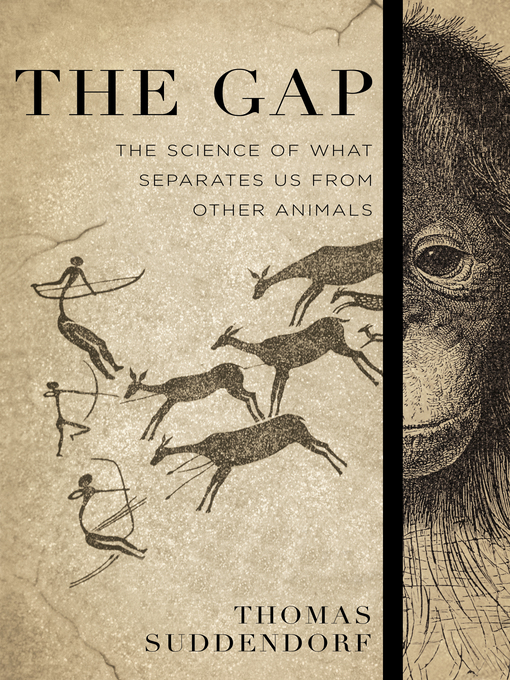In The Gap, psychologist Thomas Suddendorf provides a definitive account of the mental qualities that separate humans from other animals, as well as how these differences arose. Drawing on two decades of research on apes, children, and human evolution, he surveys the abilities most often cited as uniquely human — language, intelligence, morality, culture, theory of mind, and mental time travel — and finds that two traits account for most of the ways in which our minds appear so distinct: Namely, our open-ended ability to imagine and reflect on scenarios, and our insatiable drive to link our minds together. These two traits explain how our species was able to amplify qualities that we inherited in parallel with our animal counterparts; transforming animal communication into language, memory into mental time travel, sociality into mind reading, problem solving into abstract reasoning, traditions into culture, and empathy into morality.
Suddendorf concludes with the provocative suggestion that our unrivalled status may be our own creation — and that the gap is growing wider not so much because we are becoming smarter but because we are killing off our closest intelligent animal relatives.
Weaving together the latest findings in animal behavior, child development, anthropology, psychology, and neuroscience, this book will change the way we think about our place in nature. A major argument for reconsidering what makes us human, The Gap is essential reading for anyone interested in our evolutionary origins and our relationship with the rest of the animal kingdom.
-
Creators
-
Publisher
-
Release date
November 12, 2013 -
Formats
-
Kindle Book
-
OverDrive Read
- ISBN: 9780465069842
-
EPUB ebook
- ISBN: 9780465069842
- File size: 2607 KB
-
-
Languages
- English
-
Reviews
-
Publisher's Weekly
August 26, 2013
To determine what distinguishes the mental capabilities of humans from those of our closest living relatives (chimpanzees and great apes), Australian psychologist Suddendorf uses diverse data drawn from the worlds of human developmental theory, infant and child psychology, and primate ethology to walk a moderate line between “romantic” and “killjoy” interpretations of animal “behavior as an indicator of mind.” He explores six realms in which human thinking appears to be qualitatively different from that of animals—“language, mental time travel, mind reading, intelligence, culture, and morality”—and finally locates the gap in the interaction between two key mental capacities: nested scenario building and the urge to connect. His analysis of the of the gap’s development is much more straightforward, as he digs into evolutionary theory, molecular evidence, and the fossil record to show interbreeding and physical signs of intermediate capacities in early hominin species, positing that we Homo sapiens widened the gap by murdering our nearest evolutionary neighbors. His musings provoke thought about humanity’s place in the community of life, and he considers whether a rich or lean interpretation of the inner worlds of the creatures around us serves us best. -
Kirkus
November 1, 2013
A reader-friendly examination of the great gap that exists between human beings and the rest of the animal world and an explanation of how our minds came to be unique. In his debut, Suddendorf (Psychology/Univ. of Queensland) first looks at what we have learned about the mental capacities of other primates, describing numerous experiments and both lean and rich interpretations of data. The author's words for these differing interpretations are "killjoy" and "romantic," respectively, and he takes a position midway between them. His descriptions of the many ingenious tests to assess the capabilities of various species and of human children make for fascinating reading. In language, intelligence, theory of mind, culture and morality, humans are set apart by the ability to imagine and reflect on different scenarios and by the desire to link their scenario-building minds together. Thus, while animals have communication, humans have an open-ended language; while they demonstrate problem solving, humans have abstract reasoning; while they have memory, humans have mental time travel; while they show evidence of traditions, humans have cumulative culture; and while they display empathy, humans have morality. As to how this gap came to exist, the author posits that Homo sapiens are just one branch of the various species of hominids that once existed and that our ancestors may have played a major role in eliminating their closest relatives on the family tree. "The reason the current gap between animal and human minds seems so large and so baffling, then," writes the author, "may be because we have destroyed the missing links." He warns that the gap will widen as humans drive the great apes into extinction, but in a surprisingly hopeful conclusion, he notes that humans are capable of choosing and creating a desirable future for ourselves and for our closest relatives. A fine example of science made accessible for general readers, combining history, personal anecdotes, clear accounts of research and a broad picture of human evolution.COPYRIGHT(2013) Kirkus Reviews, ALL RIGHTS RESERVED.
-
Formats
- Kindle Book
- OverDrive Read
- EPUB ebook
subjects
Languages
- English
Loading
Why is availability limited?
×Availability can change throughout the month based on the library's budget. You can still place a hold on the title, and your hold will be automatically filled as soon as the title is available again.
The Kindle Book format for this title is not supported on:
×Read-along ebook
×The OverDrive Read format of this ebook has professional narration that plays while you read in your browser. Learn more here.


